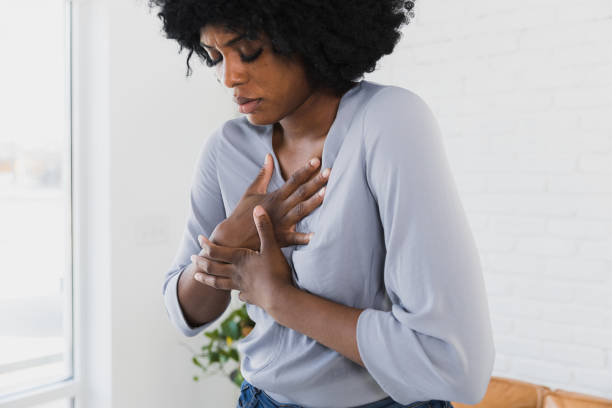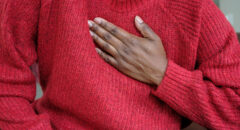
According to a recent Harvard study, only 25 percent of heart attack victims had no prior symptoms. The trouble is, these danger signs aren't necessarily the symptoms you've been warned about.
RELATED: Heart Attack vs. Cardiac Arrest vs. Heart Failure: What's the Difference?
Here are seven early warning signs that could save a life...including your own.
7. You Have an Rapid/Irregular Heartbeat
Sudden, unexplained episodes of rapid, irregular heartbeat and pulse can predate a heart attack by weeks or months. Skipped beats or arrhythmias that aren't accompanied by an increase in heart rate are less serious, though they still need medical attention. However, an irregular heartbeat accompanied by an increase in the number of beats per minute -- what's known as supraventricular and ventricular tachycardia -- can indicate a serious problem.
Scary stat: Ventricular tachycardia, particularly after exercise, is closely associated with sudden death, so it's important to get help fast.
Top clues: The symptoms are easy to confuse with a panic attack. Your heart may feel like it's pounding as if you'd just run for the bus or had a terrible fright. And the episodes are likely to come on suddenly. Typically, there's no obvious trigger for the sudden heartbeat acceleration and arrhythmia, but there is a type of ventricular tachycardia that's triggered by vigorous exercise in someone with heart disease. When these episodes last longer than a minute or two, dizziness and weakness may follow.
What to do: Call the doctor right away.
6. You Have Nausea/Stomachache
If you've been battling stomachache, nausea, or indigestion without any obvious cause, you might be mistakenly attributing cardiovascular symptoms to a gastrointestinal problem. Blockages of fatty deposits in an artery can reduce or cut off the blood supply to the heart, causing angina, which feels like squeezing, cramping, or pain. Although most people associate angina with chest pain, in many cases the body sends those pain signals down into the abdomen. Poor circulation and lack of oxygen circulating in the blood (caused by a weak heart or blocked arteries) can lead to ongoing nausea, indigestion, or vomiting, particularly in women or those over 60.
Scary stat: This symptom is particularly common in women, who are more likely to avoid going to the emergency room. This is one reason that 42 percent of women who have heart attacks die within one year, compared to 24 percent of men. And under age 50, women's heart attacks are twice as likely as men's to be fatal.
Top clues: The pain worsens with exertion and gets better with rest. You've been relying on antacids, antinausea medication, or other indigestion remedies for more than a few days. The symptoms are episodic, easing and then returning, rather than feeling like one long bout of indigestion.
What to do: Watch your symptoms for a few days to rule out a stomach virus or food poisoning. If symptoms persist, get a checkup for gastrointestinal illness, but make sure to ask your doctor to consider heart health as well.
RELATED: 5 Ways To Keep Your Heart Healthy
5. You're Exhausted
A sense of crushing fatigue that lasts for days, weeks, or even months can signal heart trouble months before a heart attack occurs. This isn't run-of-the-mill fatigue but the debilitating kind you'd typically associate with having the flu.
Scary stat: More than 70 percent of women in a National Institute of Health study reported extreme fatigue in the weeks or months before having a heart attack.
Top clues: Fatigue comes on suddenly, without any clear explanation such as extreme exertion, lack of sleep, or illness. Typically you'll start the day with close to normal energy but become increasingly tired, feeling exhausted by the afternoon. A heavy feeling in the legs is another sign. Women should be particularly alert for unexplained, long-lasting fatigue.
What to do: Call your doctor and schedule a checkup.
4. You Have Insomnia/Anxiety
A decrease in oxygen levels -- caused by changes in the heart due to heart disease -- may trigger subtle changes that lead to anxiety, insomnia, and agitation that can't be explained by normal circumstances. Looking back, people who've had a heart attack often realize they began to experience anxiety and insomnia in the months before the attack. This may be the body's way of trying to let you know that something's not right.
Scary stat: Two landmark studies, one published in Circulation and a follow-up study in the Annals of Behavioral Medicine, found a strong association between self-reported symptoms of serious anxiety and a risk of fatal coronary heart disease.
Top clues: Sudden onset of insomnia when you haven't experienced this problem before is a signal to watch out for. It can take the form of trouble falling asleep or unexplained middle-of-the-night waking. Racing thoughts or unexplained feelings of dread or impending doom are also clues.
What to do: Ask yourself whether the anxiety is related to recent events or triggers, or whether it seems abnormal in proportion to life events. Sudden, unexplained anxiety or insomnia should be discussed with your doctor.
3. You Have Pain in the Shoulder, Neck, Jaw or Arm
While chest pain is a well-known sign of heart attack, it's much easier to miss this sign if the pain mimics typical shoulder, neck, or jaw pain. Damaged heart tissue or angina -- pain from a blocked artery -- sends pain signals up and down the spinal cord to junctures with nerves that radiate out from the cervical vertebrae.
The pain may travel up the neck to the jaw and even to the ear, or radiate down the shoulder to the arm and hand, or it may center between the shoulder blades. The pain may feel sharp, or it may be a dull ache such as you'd feel with a pulled muscle.
This is a symptom doctors have only recently begun to focus on, due to patient reports post-heart attack that this was one of the only symptoms they noticed in the days and weeks leading up to the attack.
Scary stat: For 50 percent of the men who die from heart attacks, the attack itself is their first noticed symptom. Recognizing the pain of a heart attack is key to fast treatment, yet it's often missed if it's not felt in the chest.
Top clues: The pain comes and goes, rather than persisting unrelieved, as with a pulled muscle. This can make the pain both easy to overlook and difficult to pinpoint. You may notice pain in your neck one day, none the next day, then later it moves to your ear and jaw. Numbness, tightness, or tingling may accompany the pain.
What to do: Pain that doesn't go away after several days merits a medical checkup. If the pain seems to move or radiate upward and out, this is important to tell your doctor.
RELATED: 10 Things You Can Do To Prevent That Second Heart Attack
2. You are Breathless, Dizzy, or Difficulty Taking a Deep Breath
When you can't draw a deep breath, you probably assume it's your lungs, but it could be the result of too little oxygen circulating in your blood from a weakened heart. Officially known as dyspnea, shortness of breath is often the first sign of serious heart disease.
Scary stat: In a landmark study in Circulation, 40 percent of women heart patients reported shortness of breath for up to six months prior to having a heart attack.
Top clues: You feel like you're not getting enough oxygen, just as you would at a high altitude. You might also feel light-headed and dizzy. An ongoing concern or suspicion that you're developing asthma or lung disease can also be a sign your heart's acting up.
What to do: Shortness of breath can indicate a problem with the lungs, the heart, or both, so this symptom is always a reason to call the doctor.
1. You experience Excessive Sweating
Unusual sweatiness when you haven't been exerting yourself more than usual has only recently been recognized as a sign that frequently precedes heart attacks. In women, it may feel similar to the hot flashes or night sweats typical of menopause.
Scary stat: According to a University of Chicago study, excessive perspiration in many areas of the body, such as the chest, back, scalp, palms, or soles of the feet (in addition to the underarms), is often the first indicator that something's wrong -- before a heart attack begins. Excessive sweating also occurs with a condition called endocarditis, an infection of the lining of the heart and heart valves, which can trigger a heart attack or stroke.
Top clues: Flu-like symptoms, like clammy skin or sweatiness, that aren't accompanied by a fever, that last longer than a week, or that come and go over a long period of time, are signs that there's some other underlying cause, which may be heart disease.
What to do: If symptoms persist and seem unusual, call your doctor to talk through your concerns.









